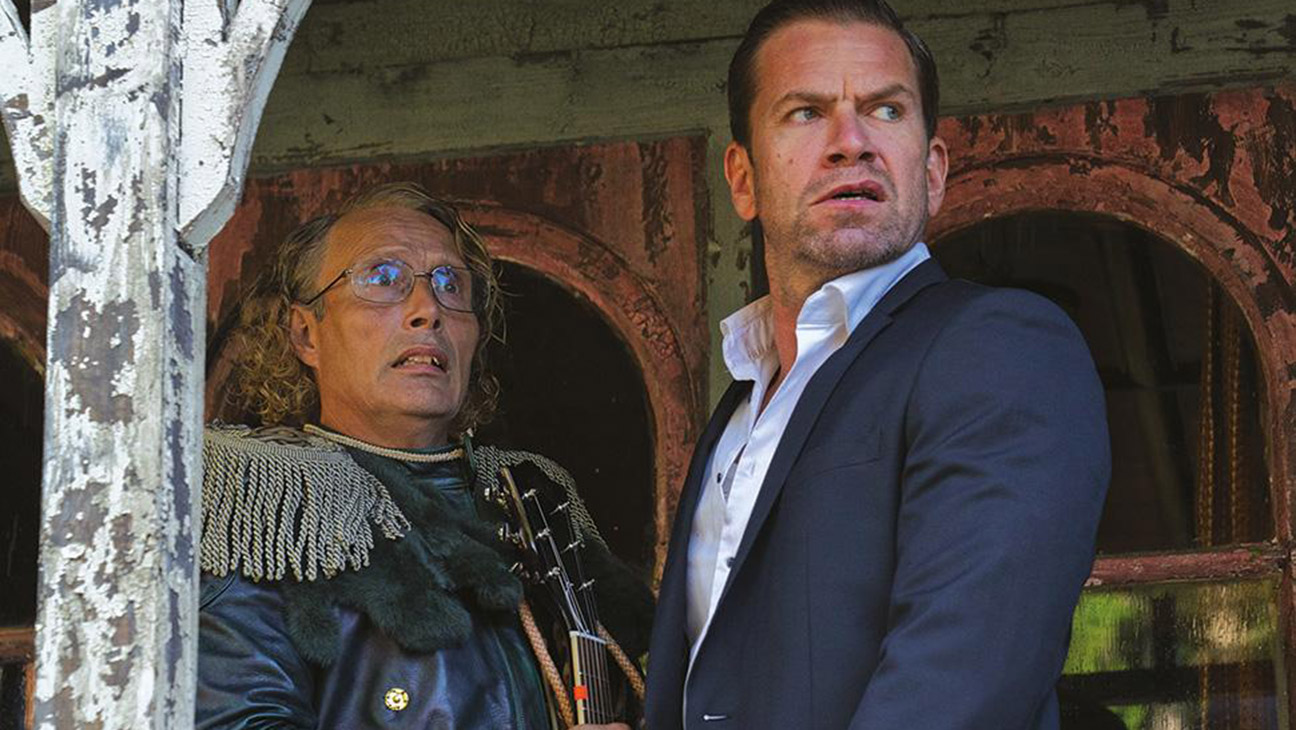Mads Mikkelsen brings a deadpan look and a great deal of grace to his role as a psychologically troubled man named Manfred, who insists on being called John because he is John Lennon. Call him Manfred and he will abruptly jump out of a moving car or dive out a window, and although he is quite banged up by the end of The Last Viking, he always bounces back.
That is just one of the absurdist strands in the latest film from Anders Thomas Jensen, known for dark comedies including the revenge story Riders of Justice (2020) and the more madcap Men & Chicken (2015). This new film is a very black comedy that is also a heist story with some bloody violence, along with a bit of knockabout slapstick and a theme of family bonds. Few directors would be able to juggle genres and navigate shifts in tone as fluidly as Jensen does here. On paper none of it should work, including the risky idea that several comic characters have been diagnosed with psychiatric disorders, but this unlikely film is consistently entertaining, weird and ultimately touching.
The Last Viking
The Bottom Line
A bloody and utterly delightful black comedy.
Venue: Venice Film Festival (Out of Competition)
Cast: Mads Mikkelsen, Nikolaj Lie Kaas, Sofie Grabol, Soren Malling, Bodil Jorgensen, Lars Brygmann
Director and writer: Anders Thomas Jensen
1 hour 56 minutes
Mikkelsen and Nikolaj Lie Kaas, who have both appeared in all five of Jensen’s previous films, play brothers here. In a quick set-up sequence, Anker (Kaas) commits a robbery and stashes the money in storage. As the police close in he asks the docile Manfred to hide the key where he used to have birthday parties as a child. Cut to 15 years later. Anker is paroled, Manfred thinks he’s a Beatle and he refuses to say where he hid the key.
That kicks off a series of ludicrous events and characters, all colorfully drawn and wringing comedy out of their straight-faced delivery. Anker drives Manfred to what used to be their family house and is now, conveniently for the film, an Airbnb. Among the cast of preposterous characters, Sofie Grabol and Soren Malling are Margrethe and Werner, the squabbling couple who own the Airbnb. Margrethe persists in thinking Anker is attracted to her despite no evidence to support that. Anker keeps digging in the woods around the isolated house — the scenic location is pretty and calm, a neat contrast to the human chaos — supposedly looking for worms although he has a metal detector.
More characters show up there, including Lothar (Lars Brygmann), the doctor who treated Manfred/John after he jumped out of the car en route to the house and who diagnosed him with dissociative identity disorder. He brings along two psychiatric patients he has had released from a hospital, with plans to create a Beatles cover band to snap Manfred out of his delusion. It’s quite clear throughout that Jensen isn’t mocking anyone’s mental state but is accepting them and making the point that every one of us, from Margrethe to the doctor and most of the rest of the world, is a little bit off.
Mikkelsen’s perfectly balanced performance is the key to maintaining that tone of understanding and empathy. Manfred may have goofy-looking curly blonde hair, but Mikkelsen portrays him as strong-willed and devoted to his brother, with a dignified stiffness that is both poignant and unsentimental. Gushiness has no place in Jensen’s world.
Kaas is also remarkable in a tough role as the stern Anker, who is sometimes just plain mean. He refuses to believe that his brother isn’t putting on an act by claiming to be John. He could have been unlikable, but Kaas always lets us see how deeply protective Anker is of Manfred. It is his great redeeming feature.
The turn to violence happens smoothly when criminals searching for Anker and his money turn up, after first trying to beat information out of Anker and Manfred’s sister, Freja. In Bodil Jorgensen’s nuanced performance, Freja looks nervous and frail but turns out to be as tough as they come.
Throughout, Jensen inserts flashbacks to the siblings’ childhood, when Manfred believed he was a Viking and was bullied for wearing a helmet to school. There are still some runes he carved on the property. Over the course of the film the flashbacks reveal that their childhood history became harsher and harsher, and as those scenes accumulate the theme of family loyalty emerges even more strongly.
In an apparently disjunctive element that is actually crucial, the film begins and ends with an animated sequence, a storybook tale of a king whose son lost an arm and who ordered everyone else in the kingdom to lose an arm to make things equal for the weakest of them. Enigmatic at first and forgotten right away, it adds resonance to the entire film by the time we return to this tale and learn its source.
The Last Viking is really about what two loving brothers will do for each other. Its humane message is potent even though it comes in the offbeat package of this gleeful, violent but entirely successful dark comedy.
